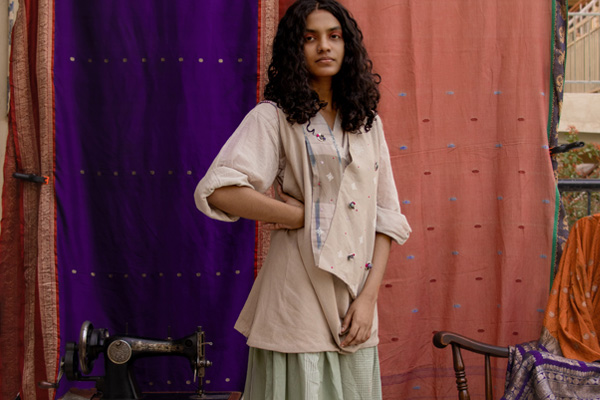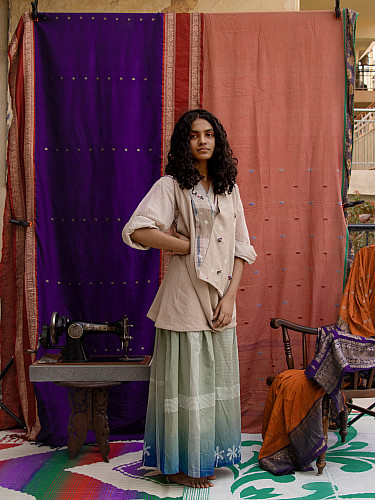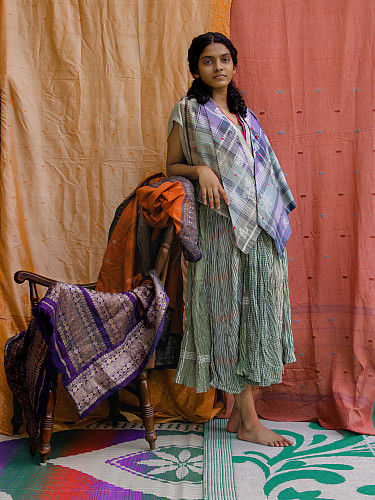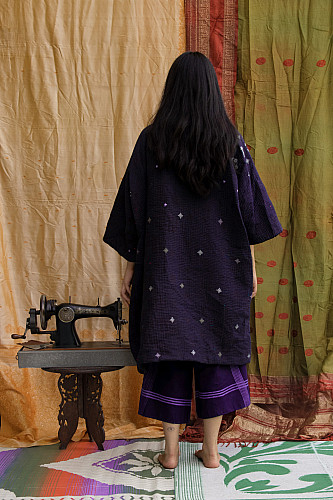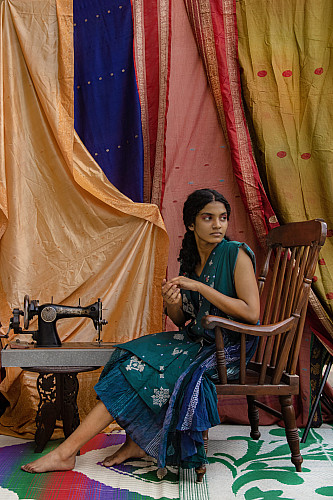Interviews, Artwork Path and Pictures by Asad Sheikh.
Anmol Venkatesh
Diploma: Bachelor of Design (Style Design)
Dwelling city: Bengaluru
How would you introduce your graduate assortment?
Baara Thangi is an amalgamation of the previous and the current; it’s steeped in nostalgia and but has parts that convey out the quirkier graphic elements of who I’m right now. This Pre-Fall assortment places craft at its centre, with an emphasis readily available embroidery, hand block printing and hand quilting, and appeals to anybody who would respect a slower, extra acutely aware lifestyle.
“Baara thangi” actually interprets to “come, sister” in Kannada; it’s a time period of endearment, one which takes me again to a childhood outlined by a free-spirited way of life. This assortment prompts the wearer to pursue a future that values crafts which can be timeless and to maintain that flamboyant little one inside alive always.
What are the underlying ideas — the first inspirations — behind your assortment?
I search inspiration from a extra sustainable pursuit of residing and one which upholds the advantage of upcycling. I drew from my upbringing, and that of lots of people from my technology, through the early 2000s, in a Bangalore that also had a sure old-world attraction to it. I additionally drew from childhood recollections of beautiful kolam patterns [decorative designs drawn on the ground, traditionally with rice flour, in southern India] strewn throughout jet-black tar roads, the consolation of my grandmother’s cotton saris, stark white kasuti work [a type of counted-thread embroidery practised in northern Karnataka] on heirloom clothes and Madras lungi materials, and paired them with quirkier coronary heart motifs, or silhouettes which can be geometric and asymmetrical.
A lot of my materials had been painstakingly collected from second-hand sari retailers or donated by my grandmother or different kinfolk again house. It was vital to not use any contemporary material and to reuse material waste or textiles that had tales to inform. I additionally wished to current textiles and crafts which can be widespread to our on a regular basis existence in a fashion that prompts us to have a look at them by a brand new lens.
Inform us concerning the strategies you’ve got used and your design ideology.
My design course of started by enriching the narrative that I wished to convey forth by the gathering. This concerned the in depth curation of photographs that then grew to become very detailed temper boards. It was a mirrored image of how vital craftsmanship is to me and represented a seamless mix of textures that might go collectively alongside a fine-tuning of a color palette.
I then launched into a month-long journey to the craft clusters the place these traditions hail from. I first went to lungi-weaving clusters round Cuddalore, in Tamil Nadu, the place Madras checks are woven for export. I understood the hassle that went into creating one thing that I had taken as a right whereas rising up — the common-or-garden lungi now had a lot extra to inform.
I additionally visited Ilkal, in northern Karnataka, the place the well-known Ilkal saris are woven and historically completed with kasuti work. Right here, once more, motifs and strategies that had been perfected over centuries got here to life in entrance of me.
I had been concurrently engaged on quilting recycled materials and placing collectively fragments of previous saris, dhotis and textiles that I had collected by my time at NIFT. The silhouettes that I had in thoughts drew extensively from minimal-waste pattern-making and had a geometrical asymmetry that was integral to them.
May you describe your favorite look?
My favorite look includes a hand-quilted jacket with very detailed kasuti and kolam patterns embroidered on it. The bottom material took over per week to be painstakingly hand-quilted, and this was then overdyed to go well with the color palette. The jacket includes an uneven entrance panel, connected from every shoulder. These panels have refined stripes on them, an imitation of a black tar highway with kolam. The sample takes inspiration from the kimono, and the remnants from the essential construction had been used to create the collars in an try and minimise material waste.
The embroidered motifs are scattered — uneven and but balanced. Lilac and bright-pink hearts add that much-needed pop of color and provides life to a quirkier sensibility that I wished to spotlight. Small trinkets made with material buttons, metallic beads and overdyed lace have been connected at sure locations, virtually like little secrets and techniques ready to be found. The jacket is lined with an overdyed lungi.
The lilac high worn beneath has been made totally from a repurposed silk sari. Braided tassels from both shoulder are tied on the entrance, mimicking parts that I’ve noticed on kids’s clothes. Brightly colored loop buttons maintain the highest in place on the aspect seams.
Block-printed culottes full the look, and these are held in place on the waist by utilizing lungi materials which were transformed into tassels.
Conversations round private illustration have gotten more and more distinguished in right now’s style world. In that regard, how would you say your work displays who you’re?
As somebody who doesn’t costume in response to typical gender norms, I didn’t need to impose the identical on my assortment. For example, utilizing the lungi, which is a material that’s historically worn by males, as a part of clothes that might be worn by anybody, no matter gender, displays the identical sentiment.
Which format would greatest translate your work to the buyer — bodily retail areas, on-line shops, demi-couture, or purely as a type of visible consumption by photographs solely?
My work may be very textural. It will be greatest translated when exhibited in a bodily house, whether or not it’s a retail retailer or an exhibition of some type. These, supplemented by photographs, movies and different technique of digital show could be ideally suited. It is extremely vital for me that folks truly work together with the garments and perceive the place I come from.
How has the shift in direction of digital style affected your artistic course of?
The shift in direction of digital style is actually a boon to somebody like me, who’s geared in direction of decreasing textile waste — it permits me to make adjustments digitally earlier than implementing them on materials. With out entry to numerous assets, engaged on digital 3D prototypes has been a lifesaver for me. Contemplating how fast-paced the digital world is, my artistic course of will get a lift, and I can allow my imaginative and prescient to be translated onto garments at a a lot quicker fee.

